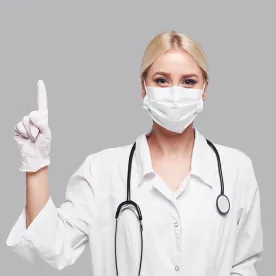This alert was originally published on April 8, 2020, and was updated on April 22, 2020, to reflect new developments.
MassHealth stabilization funds, in excess of $800 million, will be divided among hospitals, nursing facilities and other healthcare providers dealing with the effects of the Coronavirus (COVID-19) pandemic. The funds are expected to be available from April through July 2020. MassHealth has released additional details about the allocation of funds.
IN DEPTH
On April 7, 2020, Massachusetts Governor Charlie Baker announced $800 million in MassHealth funds that will serve as “stabilization funding” aimed at assisting Massachusetts Medicaid (MassHealth) providers hard-hit by the Coronavirus (COVID-19) pandemic. Recent announcements have clarified that the allocation of funds to MassHealth providers will likely be in excess of $800 million. Below is a summary of the stabilization funding details and developments to date, as well as key insights on the information provided thus far.
MassHealth anticipates making these funds available beginning in April 2020 and will provide the funding through July 2020. The $800+ million in stabilization funding will be divided among hospitals, nursing facilities and other healthcare providers.
1. Support to Hospitals
More than $400 million of the $800+ million in MassHealth funds will be allocated to hospitals, with the majority of funding designated to support 28 “safety-net and high Medicaid hospitals.” The governor’s announcement does not enumerate these 28 hospitals. In addition, MassHealth’s summary of the funding indicates that the $400 million to hospitals will also support Hospital Licensed Health Centers, such as Brookside Community Health Center; MGH – Back Bay Health Center; Codman Square Health Center; East Boston Neighborhood Health Center; and East Cambridge Health Center.
The roughly $400 million allocated to hospitals includes a 20% rate increase for COVID-19 care to Medicaid beneficiaries, as well as a 7.5% increase in rates for all MassHealth care provided. The 20% rate increase for COVID-19 care is not defined. While recent MassHealth Guidance indicates that COVID-19 care includes home visits related to the virus, quarantine in hospital, and diagnostic lab services with respect to testing for the virus, providers will need further guidance on what additional specific care is actually subject to the rate increase. Updates likely will be posted to the MassHealth Provider Guidance page along with relevant COVID-19 billing codes as they are generated.
2. Support to Nursing Facilities
Governor Baker’s press conference on April 15, 2020, revealed that $130 million from the stabilization funding will be allocated to nursing facilities, an increase of $50 million above what Baker initially announced for these providers, including $50 million in the form of a 10% MassHealth rate increase available to all nursing homes effective April 1. Nursing facilities do not need to request supplemental payments; all eligible providers will automatically receive these payments, and such payments will be distributed by the 15th calendar day of each month. MassHealth will use the nursing facility provider’s current bank information on file to distribute supplemental payments. Details on the calculation of the supplemental payments to nursing facilities can be found here. In addition, the following support is available to nursing facilities from MassHealth:
-
Long-Term Care Staffing Portal and Signing Bonuses: To address long-term care staffing shortages at facilities, MassHealth has created a portal for facilities to identify staffing needs, and for healthcare professionals, including nurses, aides, social workers, and occupational and physical therapists, to apply for positions at those facilities. According to MassHealth, the portal matches supply to demand and fills the “high priority” locations first; however, demand is far outpacing supply thus far. In order to incentivize use of the portal, MassHealth has allocated approximately $1 million to fund signing bonuses of $1,000 each, which nursing facilities pay to each staff member hired through the portal since its launch on April 8 through May 15, 2020. This includes staff hired as W-2 employees or individual independent contractors, but does not apply to individuals engaged through temporary staffing agencies. The nursing facility must submit documentation 30 days after the individual’s start date to verify that the bonus was paid and that the individual worked for at least 128 hours within 30 days of the employee’s start date. Notably, these staff (and facilities that hire them) do not need to be dedicated to providing COVID-19 care.
-
Nursing Facilities with Dedicated Isolated COVID-19 Wings and Units: Nursing facilities that create dedicated COVID-19 wings and units are eligible for an additional 15% rate increase in the form of $30 per MassHealth member per day to support additional staffing, infection control and supply costs throughout the duration of the state emergency. This applies to all residents in the nursing facility, not just those in the COVID-19 isolation space. To qualify as a nursing facility with a dedicated COVID-19 unit or wing, the nursing facility must submit a form attesting to meeting the criteria for an isolated COVID-19 unit. Monthly lump sum payments to facilities with COVID-19 units and wings will be paid for the duration of the state of emergency, effective on the date MassHealth receives an attestation of compliance with the requirements. Payments are subject to inspections and audits of compliance with the requirements.
-
Skilled Nursing Facilities That Are Dedicated COVID-19 Sites of Care: Finally, $30 million of the stabilization funds will be used to support skilled nursing facilities that are designated by the state as dedicated COVID-19 sites of care. Supplemental Rates (not less than $600 per MassHealth member per day) for residents in the COVID-19 dedicated facilities will be in place until the last COVID-19 resident is transferred or discharged from the facility. Details on calculation of the supplemental payments can be found here.
3. Support to Other Healthcare Providers
The stabilization funding also includes more than $300 million designated for “other health care providers that are delivering medical care for COVID-19 or providing services that keep residents safe in their homes”:
-
Physicians and Physician Practices: MassHealth has allocated $15 million of these funds to support increased rates for MassHealth-covered surgery, anesthesia, medicine and radiology services provided by physicians and group practices. For dates of service from April 1, 2020, through July 31, 2020, MassHealth will increase rates by 15% for certain of the top 100 CPT physician codes with established MassHealth rates/fees and all home-based evaluation and management services for new and established patients (CPT codes 99341-99350). MassHealth acknowledges that providing these services in-person may be difficult in the current environment and encourages providers to deliver services via telehealth when appropriate, as outlined in its guidance here.
-
Personal Care Attendants and Home Health Agencies: Approximately $30 million of the funds is allocated to personal care attendants (PCAs), and $13 million is allocated for home health agencies, in the form of higher rates for services provided to MassHealth beneficiaries. MassHealth has acknowledged that while the public health emergency has increased the need for home-based care, the emergency has also made the delivery of these services more difficult and costly. Accordingly, MassHealth has established higher rates from April 1, 2020, through July 31, 2020, to ensure the continued delivery of these critical services. See the updated rates here for PCA services, here for home health services, and here for CSN services. These rates are available for any MassHealth patient being treated by these providers and does not need to be related to COVID-19 care specifically.
-
Long-Term Services and Supports: For providers of long-term services and supports (LTSS), $42 million is allocated to Adult Day Health programs and $39 million is allocated to Day Habilitation programs that have converted from group programs to actively serving members via alternative means. Guidance for MassHealth LTSS Providers can be found here. LTSS providers receive an add-on rate intended to address costs incurred that are associated with COVID-19 in the amount of 10% of the provider’s average monthly state funding for the months of November 2019 through January 2020. A listing of the specific supports and services that receive this add-on can be found here.
-
Behavioral Health: Community behavioral health providers, including Early Intervention (EI) Program, Children’s Behavioral Health Initiative (CBHI), Program of Assertive Community Treatment (PACT) and Applied Behavioral Analysis (ABA) providers, will receive more than $100 million in stabilization funds. For dates of service from April 1, 2020, through July 31, 2020, payment for certain MassHealth-covered services will be increased by 10% above current rates. For more information on these rate updates, visit the guidance for EI providers here, CBHI providers here, PACT providers here and ABA providers here.
-
Substance Abuse: To support certain substance-related and addictive disorders programs that include acute treatment services (ATS), clinic stabilization services (CSS), substance use disorder (SUD) outpatient services and Opioid Treatment Program (OTP) providers during the COVID-19 emergency, MassHealth will increase rates for certain MassHealth-covered services by 10% above current rates. An administrative bulletin listing the updated rates can be found here for ATS and CSS service providers, here for SUD outpatient services providers and here for OTP programs.
-
Community Health Center: More than $50 million will be allocated to community health centers from the stabilization funds. MassHealth will pay each community health center a monthly supplemental payment from April through July 2020. A community health center’s monthly supplemental payment will be equal to certain percentages of that community health center’s average monthly claims paid by MassHealth and MassHealth Managed Care Entities for services provided in certain categories in fiscal year 2019. For more details on these supplemental payments, see the administrative bulletin here.
-
Ambulance Providers: To support transportation providers during the COVID-19 emergency, for dates of service from April 1, 2020, through July 31, 2020, MassHealth will increase the rates of certain ambulance services by 50% above current rates. The updated rates for ambulance services can be found here. Additionally, for dates of service beginning April 10, 2020, MassHealth has established a rate for ambulance services related to the transport of specimens from congregate group sites for COVID-19 testing, performing diagnostic testing and communicating test results in the amount of $305. See the rate update here.
4. Key Takeaways
The stabilization funding is in addition to the previously unveiled $290 million in cash relief and $550 million in accelerated payments announced last month. The governor’s announcement did not foreclose the government from providing additional funding at a later date, and stated that the Executive Office of Health and Human Services will “continue to monitor and evaluate the situation.”
The stabilization funding comes as healthcare providers are reeling financially from their inability to perform elective procedures in order to reserve capacity to address the coming surge of COVID-19 patients. The Governor noted that MassHealth is able to provide the relief package because of “savings MassHealth is seeing by not paying for those elective procedures, along with increases in federal reimbursement rates to deal with COVID-19 treatment.” For this reason, deploying the aid package will not require a supplemental budget or legislation.





 />i
/>i

